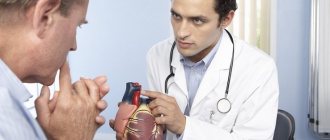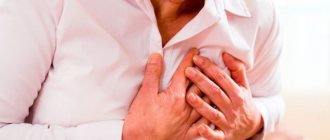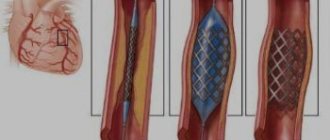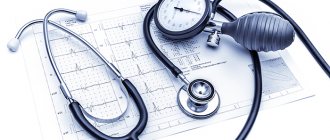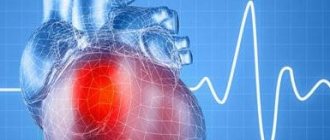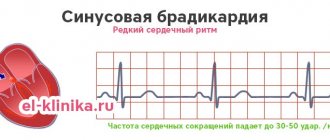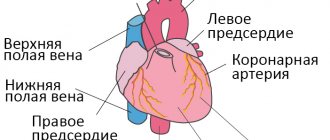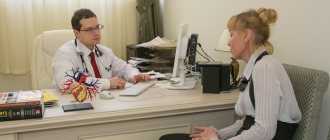Arrhythmia is a deviation of the heart rate from the normal value. In a normal state, the range of the number of contractions of the heart muscle is quite wide. The heart rate depends on the physical load on the human body and on the emotional state. With strong emotions, the number of heart beats per minute increases significantly. An increase in the number of heart beats per minute for no apparent reason is called tachycardia. On the contrary, a decrease in the number of beats is bradycardia. If premature vibrations of the heart occur, these contractions are called extrasystoles. If the heart rhythm is delayed or follows paths other than normal, the process is called arrhythmia. This abnormal heartbeat can be either regular or irregular.
Arrhythmia processes can occur in different areas of the heart: in the atrium and in the ventricles. Arrhythmias that occur in the ventricles are for the most part not life-threatening, but cause the most serious condition of the patient. Most arrhythmias do not affect the function of the heart as a blood pump. Therefore, there is no great risk to human life. But such conditions themselves can cause great anxiety to the patient. Although, as soon as a person understands that his condition is not life-threatening, the anxiety goes away.
Symptoms of arrhythmia
The feelings experienced by a person suffering from arrhythmia can vary significantly. The main sign of arrhythmia is the sensation of a beating heart when lying on the left side. But even absolutely healthy people can feel the rhythm of their hearts. If a person suffers from arrhythmia, then he regularly feels an atypical heart rhythm.
If an arrhythmia occurs, then due to a lack of oxygen delivered to the organs, and in particular to the brain, headache, fainting and dizziness may occur. If the symptoms described above occur frequently, you should consult a doctor for examination.
Weight correction as arrhythmia prevention
Excess weight is considered a predisposing factor to the development of many diseases. Obesity significantly increases the likelihood of arrhythmia, so you need to keep your body weight within normal limits and, if necessary, adjust it. To get rid of extra pounds, you need to adhere to a proper balanced diet, lead an active lifestyle, and give up bad habits. Phytotherapy
Additional stimulation with natural substances, without the use of drugs, is an excellent prevention of arrhythmia.
Infusions and decoctions of the following herbs have a good effect on the cardiovascular system:
- calendula;
- valerian;
- yarrow;
- Melissa;
- chicory;
- hawthorn;
- motherwort;
- mint, etc.
Such herbal teas have a calming effect. If there is a need for diagnosis or treatment of arrhythmia, Turkish clinics provide high-quality medical services at affordable prices.
Causes of arrhythmia
The main and most common causes are alcohol abuse, smoking, physical and emotional stress, stress and depression. The quality of heart contractions can be affected by the pathological condition of the thyroid gland; some medications have the effect of arrhythmia. These are, for example, drugs for normalizing high blood pressure and treating lungs. Arrhythmia is often a consequence of severe heart pathology, so first of all it is necessary to treat the underlying ailment that caused it. These are such severe pathologies as ischemic disease, abnormalities in the condition of the heart valves, and manifestations of heart failure. Sometimes arrhythmias appear out of the blue without a specific reason.
A healthy lifestyle as a way to prevent arrhythmia
To maintain health, you should give up bad habits; they have a very negative impact on the functioning of the cardiovascular system. Moderate physical activity, which strengthens the immune system and improves heart function, has a positive effect. Walking in the fresh air, jogging, breathing exercises, swimming, skiing and other gentle sports are especially useful. Healthy, complete sleep and rest, and adherence to a daily routine are very important for the prevention of arrhythmia. You also need to pay attention to the state of the nervous system and psycho-emotional state. Frequent stress and autonomic disorders contribute to the appearance of cardiac pathologies. Avoid conflict situations, stress, excessive mental stress, maintain peace of mind and calm.
Diagnosis of the disease
In diagnosing any type of arrhythmia, it is important to describe the symptoms and sensations as accurately as possible. The doctor needs to know the heart rate, whether it is low or high, how often this condition occurs, how long the attack lasts, whether it is accompanied by dizziness, headaches, whether there were fainting, chest pain, shortness of breath and other strange sensations.
In addition, the doctor needs to tell in what situations these sensations occur: at rest or during physical activity. As the painful process occurs, it begins with sharp pain or its intensity gradually increases. To more accurately determine the patient's condition, various clinical studies are conducted. The main way to detect abnormalities in heart rhythm is a cardiogram. This study makes it possible to obtain a graphical diagram that displays the frequency and intensity of the heartbeat.
Holter monitoring makes a more thorough study of heart rhythm, which can be done in our clinic. The patient carries the monitor with him throughout the day. The device records heart rate at every moment of time. In addition to this, the subject keeps regular records of his actions and feelings. This method allows you to identify serious abnormalities and their frequency more accurately.
If the arrhythmia can be life-threatening, and the patient’s condition is quite serious, then a heartbeat study is carried out while the person is hospitalized. In these cases, an electrophysiological study is performed. Here a special probe is used, inserted through a vein directly into the heart. To accurately diagnose the patient's standing, various stimulants and special methods of monitoring cardiac activity are used.
Why can heart palpitations occur after eating?
Heart palpitations are a subjective phenomenon that occurs when you feel your heart beating faster; There may be pulsation or fluttering in the chest, and sometimes discomfort in the throat. In some cases, palpitations may be caused by eating or drinking; in any case, if you are worried about this problem, then you need to be examined by a good cardiologist in Strogino, as well as by a neurologist in a medical clinic, since the sensation of your own heartbeat can be not only a cardiological problem, but also a neurological one. In this article we will look at the causes of rapid heartbeat after eating.
- Alcohol. The heart rate increases due to alcohol consumption - it is alcohol that changes the heart rhythm, as scientists from the University of California, San Francisco have found. The heart rate is especially elevated in people with arrhythmia. Alcoholic drinks cause an attack in patients with atrial fibrillation - a violation of the synchronization of the contraction of the ventricles in the heart and the atria, in which the upper chamber contracts too often. Even a small amount of alcoholic drinks provokes heart palpitations after eating.
- Caffeine. Many people know that coffee provokes a rapid heartbeat, especially strong coffee, as well as drinks containing caffeine: carbonated sweet drinks, chocolate, strong tea.
- Individual reaction. A reaction to taking a particular food or drink can cause anxiety. In this case, if the patient is concerned about increased heart rate after eating, he needs to see a doctor to get tested.
- Medications. Some medications for asthma, diabetes, and other conditions may cause heart palpitations, including cold and allergy medications that contain phenylephrine or pseudoephedrine, and insulin may also cause heart palpitations.
- Dietary supplements. Some dietary supplements also affect heart rate, such as ginseng, hawthorn, valerian, bitter orange oil, ephedra.
- Smoking. Nicotine can also cause heart palpitations.
Regardless of food intake, there are many factors that can provoke this phenomenon:
- anxiety and excitement
- low blood pressure
- low blood sugar
- thyroid disease
- heart diseases
Pregnant women, patients with heart failure, cardiomyopathy and other pathologies may also suffer from palpitations, and in order to identify the cause and prescribe the necessary treatment, you need to contact a medical cardiologist and undergo a full examination.
Treatment
.
Depending on the diagnosis, a good cardiologist or neurologist will prescribe treatment, which may include: quitting smoking and drinking alcohol, following a diet, taking sedatives and dietary supplements, doing yoga and meditation, physical exercise, as well as recommendations for reducing stress. situations at work and in everyday life.
Treatment of arrhythmia
Often, when a doctor prescribes a small dose of medication and with lifestyle corrections - quitting smoking, alcohol, intense physical and emotional stress - the arrhythmia gradually goes away.
For the treatment of pronounced arrhythmias, as well as severe conditions, a pacemaker is used. This is a device that replaces the work of the heart. Using electrical impulses, it tells the heart to beat at the correct frequency and intensity. This device is implanted under the patient's skin in the chest area. Special electrodes that are directed to the heart through the vessels and impart an electrical impulse to it. Thanks to modern technological developments in the field of medicine, the batteries that support the operation of the device can last from 8 to 10 years. The device is designed so that neither extraneous microwaves, nor electrical devices, nor radars and other equipment interfere with the operation of the pacemaker. The only exceptions are magnetic resonance imaging devices and other devices intended for physical treatment.
Pacemakers are used mainly in cases where, as a result of arrhythmia, the heart makes a small number of contractions. Then the stimulator normalizes the rhythm and brings the number of contractions to normal. In the opposite case, when the arrhythmia is accompanied by too intense heartbeat, the stimulator is used very rarely.
In some serious cases, arrhythmia requires surgery. If the arrhythmia is caused by coronary heart disease, then in this case an operation called balloon angioplasty or coronary artery bypass grafting is performed. Sometimes arrhythmia is caused by a malfunction of the electrical center in the heart. It is eliminated by catheter ablation, when a catheter is inserted into the heart and a series of radiofrequency current discharges are applied through it.
Arrhythmia that occurs after a heart attack is treated with open-heart surgery, which removes the damaged muscle that is interfering with the normal functioning of the heart.
Intestinal arrhythmia is one of the most common conditions of a modern person who considers himself healthy, and it occurs long before he can become a patient. This arrhythmia is typical not only for patients with internal diseases, but also for 50-80% of the population who are in the so-called “third state” - between health and an as yet unconscious disease. Intestinal arrhythmia is a violation of the regularity of the circadian rhythm of the intestinal evacuation function when the frequency of this rhythm deviates from the physiological one.
Normally, during daily nutrition, the frequency of intestinal evacuation function should not deviate from the regular circadian rhythm with a period of 20-28 hours. The normal frequency of cleansing the body of substances harmful to its health should be at least 7 times a week. From the standpoint of chronomedicine, what is adequate for a healthy person is the daily rhythm of removing harmful metabolites from the body. With intestinal arrhythmia, when the regularity of elimination of toxic substances from the intestines is disrupted, the likelihood of disease increases significantly.
The need to eliminate intestinal arrhythmia has three main aspects.
- Firstly, eliminating irregularities in bowel function can help prevent internal diseases, since intestinal arrhythmia is one of the “universal pathogenic blocks.”
- Secondly, eliminating the irregularity of the body’s self-cleansing of carcinogenic metabolites can serve to prevent cancer, since intestinal arrhythmia is a proven risk factor for colorectal cancer, pancreatic cancer and gall bladder cancer.
- Third, eliminating intestinal arrhythmia is necessary to improve health-related quality of life both in people who “consider themselves healthy” and in seriously ill patients.
Intestinal ari
Intestinal ari, as was previously believed, and “the initiator of internal diseases,” as is currently believed.
Intestinal arrhythmia, as a functional disorder, usually precedes the onset of organic changes; it occurs already in the first year of life, long before the onset of most internal diseases. The universal nature of intestinal arrhythmia is evident from the fact that its late stages are detected in more than 60% of patients with hypertension, in almost 70% of patients with varicose veins and in 50-80% of patients with gastric and duodenal ulcers.
Therefore, timely elimination of intestinal arrhythmia can help prevent many diseases and improve the quality of health. Elimination of intestinal arrhythmia in terms of cancer prevention is due to the fact that it can lead to a decrease in the concentration of carcinogenic metabolites and reduce the duration of their action on the intestinal mucosa. The health-related quality of life of pregnant women in the absence of intestinal arrhythmia was almost 20% higher than in the presence of this arrhythmia.
Modern approaches to eliminating intestinal arrhythmia
Modern approaches to eliminating intestinal arrhythmia take into account the multifactorial nature of its origin and are multifaceted. First of all, the doctor explains to the patient the rhythmic essence of intestinal activity, pointing out that the circadian rhythm of the gastrointestinal tract is its attributive property. Medicines that themselves are inducers of constipation are discontinued: analgesics, antidepressants, calcium antagonists and others.
For intestinal arrhythmia, you should not prescribe widely used laxatives, which are not so much helpful as harmful to health.
- Senna extracts containing anthraquinones damage colonic neurons and increase the permeability of the intestinal barrier, promoting allergic reactions.
- Phenolphthalein turned out to be a carcinogen, so it has been officially banned in the United States since 1999.
- Bisacodyl can cause urolithiasis.
- Sodium picosulfate can lead to fatty degeneration and necrosis. Saline laxatives cause disruption of water-electrolyte metabolism in the form of hypokalemia, which is dangerous for the heart.
- Synthetic prokinetics can cause galactorrhea and gynecomastia.
To eliminate intestinal arrhythmia it is necessary.
To eliminate intestinal arrhythmia, it is necessary to take an adequate amount of fluid (1.5-2 liters per day) in the form of juices, fermented milk products and mineral water.
Wholemeal bread and about 500 g of vegetables and fruits per day are recommended. Be sure to take into account the essential role of regular physical activity for daily bowel function.
When prescribing medications that eliminate intestinal arrhythmia, it is necessary to choose only safe and highly effective drugs.
These currently include macrogol 4000 and mucofalk. These medications are not absorbed in the intestine and help retain sufficient fluid in the colon. They form a comfortable stool and do not have side effects that are dangerous for the patient.
- Macrogol 4000 (Forlax, Bofur Ipsen) is effective when taken as a course and is not addictive.
- Forlax helps to delicately solve a delicate problem even in pregnant women, diabetics and hypertensive patients.
- Mucofalk(r) by swelling and binding water in the intestine accelerates the movement of contents through the intestines and increases the volume of stool.
By regulating passage through the intestines, mucofalk reduces the spastic state of the colon, which leads to the elimination of intestinal arrhythmia and the restoration of regularity in bowel function. It is extremely important that the elimination of intestinal arrhythmia with mucofalk in patients with hypercholesterolemia leads to a decrease in the level of cholesterol and low-density lipoproteins in the blood serum by 15-20%.
K. A. Shemerovsky, leading researcher at the Research Institute of Experimental Medicine, St. Petersburg
